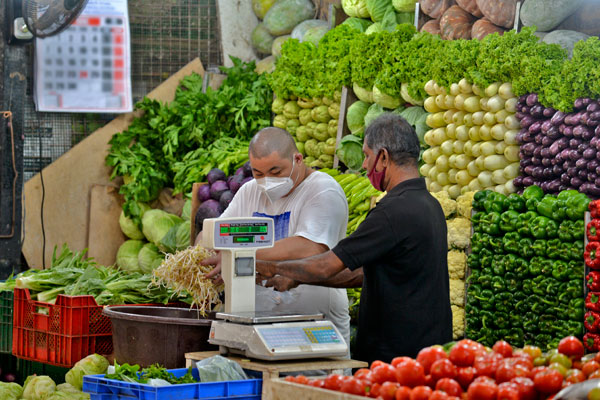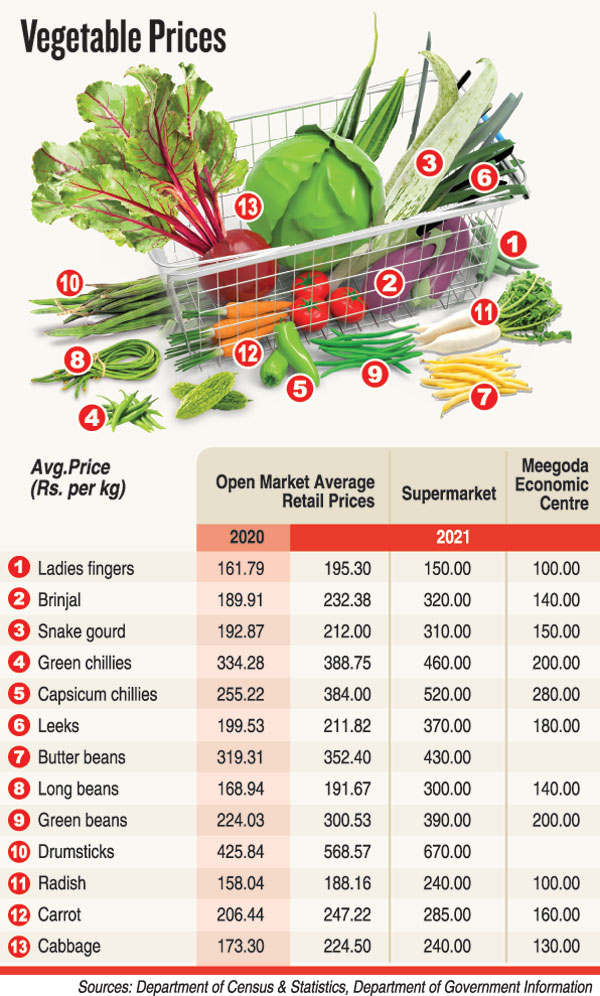News
Crazy food prices sting the poorest as relief bodies trim aid

Kollupitiya market. Pic by Eshan Fernando
Relief organisations are struggling to help low-income families, the disabled and elderly with dry rations, vegetables and prepared meals as the fuel price hike sends food prices rocketing.
The charity organisation, Voice of the Voiceless, like many bodies distributing free food during the pandemic, said it has been forced to reduce the quantity of dry rations included in relief packs.
“We cannot burden donors by asking for more money so we have reduce quantities in the relief packs,” Voice of the Voiceless Director Moses Akash said.
“Usually, a kilo of dhal is included in each Rs. 2,500 pack, but this has been reduced to 500 grams. It’s the same with items like onions, potatoes and sprats. Canned fish has gone up and we cannot afford to include that. It is the low-income families who will again suffer from this situation,” he said.
He said families had survived by eating jak fruit for days at a time during the lockdown.
“Even meals at elders’ homes have been reduced from two vegetable preparations to one vegetable dish. We were able to send a vehicle to Nuwara Eliya and get vegetables directly. But many homes for the aged and orphanages are struggling with the increasing cost of food items,” he said.
The sky-rocketing cost of living has brought hardship to many, with complaints that getting a meal prepared was a struggle due to the increasing cost of vegetables, pulses, rice, coconut oil and other condiments.
Cowpea and green gram have increased by 105.3 per cent and 198.1 per cent respectively compared to last year, the Census and Statistics Department said. A kilo of green gram is close to Rs. 1,000 a kilo up from about Rs. 325 last June.
Dhal went up to from Rs. 172 last year in markets to Rs. 220 a kilo.
Carrots, sold for Rs. 206 a kilo a year ago, now are sold at Rs. 245 in the markets and cost Rs. 40 more in supermarkets. Radishes were Rs. 158 a kilo last June but in most supermarkets now cost Rs. 240. Drumsticks used to be Rs. 425 but are now Rs. 577 in markets and Rs. 670 in supermarkets.
Capsicum, sold last year for Rs. 255 in markets, has more than doubled in supermarkets to Rs. 520. Brinjals used to be Rs. 190 but are now Rs. 233 in markets and Rs. 320 in supermarkets. Snake gourd has gone from Rs. 192 to Rs. 220 and Rs. 310, leeks from about Rs. 200 to Rs. 217 and Rs. 370.
The price of green beans has risen by up to Rs. 100. Ladies fingers, green chillies, pumpkins, kohila, butter beans, cabbage and tomatoes have also become more expensive. 
Tinned fish continues to be costly, selling for Rs. 320. Last week, it was Rs. 313. Last year, it was Rs. 278. A 750ml bottle of coconut oil sells or Rs. 563, up from Rs. 390.
“While people are now feeling the increase in prices of food items, in a few weeks they will see prices of other goods and services increasing. Especially after travel restrictions are lifted, all products and services will see price hikes,” convener of the National Trade Union Centre, Wasantha Samarasinghe, said.
Without salary increases people will find it difficult to manage basic expenses, he said.
Mr. Samarasinghe, who is also the President of the Inter-Company Employees Union, warned unions would take to the streets in protest if the government failed to bring down the cost of living.
People are using credit to buy staples such as milk powder and dhal, and even cheaper items such as potatoes and onions, Rajagiriya grocery vendor Saman Priyalal said.
“Day-wage earners were without any income during the past two weeks. So were self-employed people, who have been suffering for months,” he pointed out.
Families, especially those with limited incomes, are struggling to have a decent meal.
“The Rs. 5,000 government relief aid was not enough for a family to even have basic meals over a few weeks. When school starts, expenses will increase even more,” Ranjanee Silva from Soysapura said.

Pettah market. Pic by Akila Jayawardana

